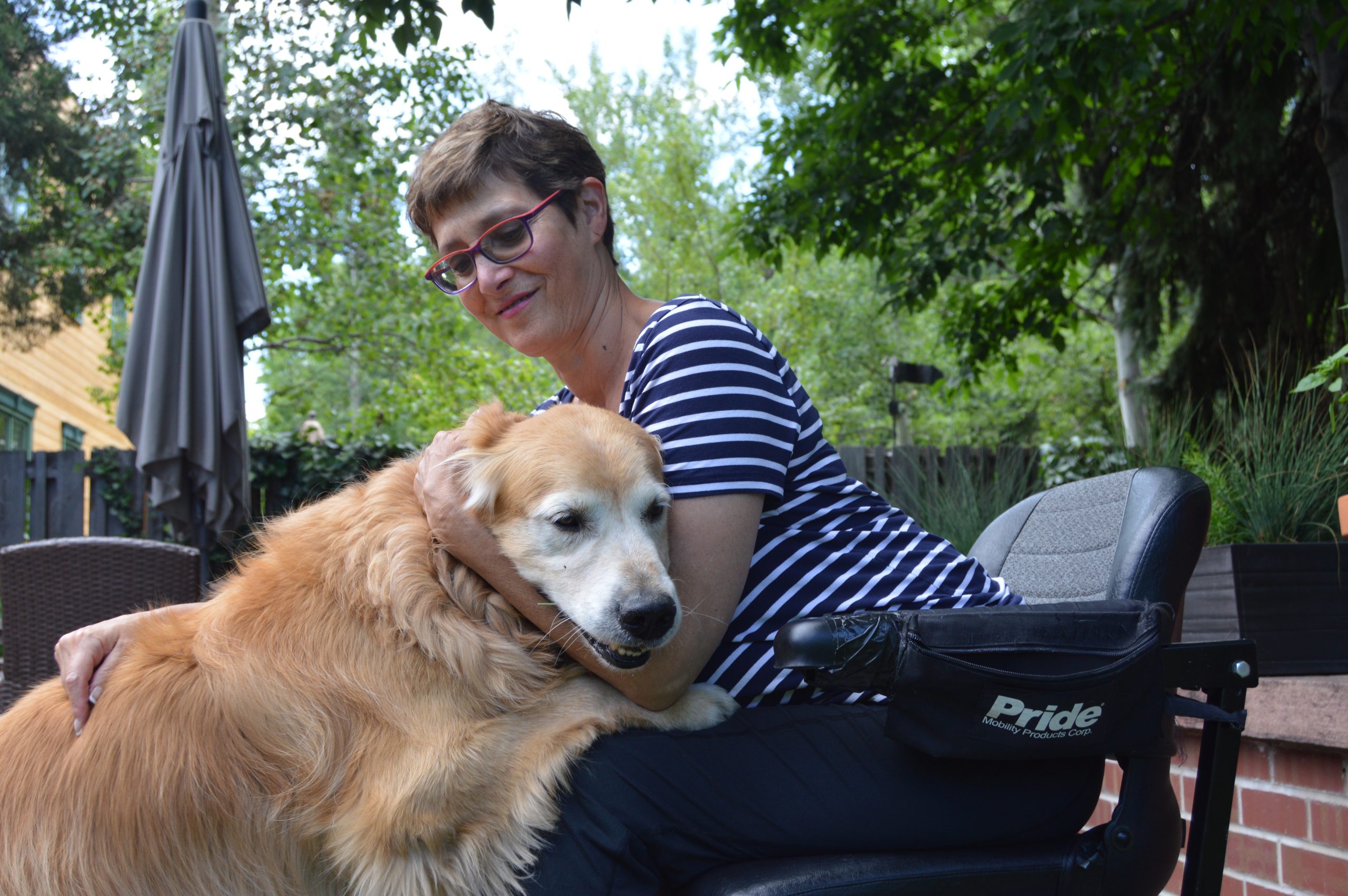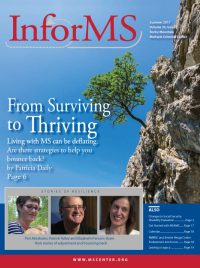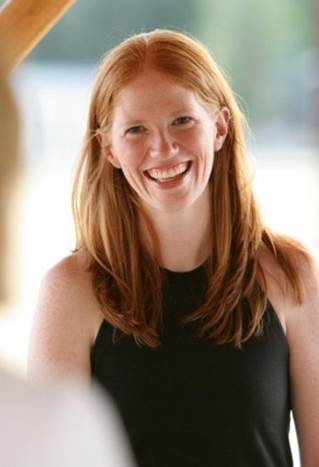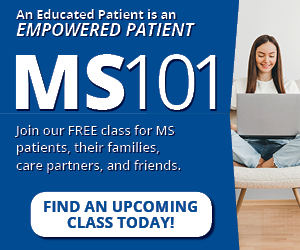“I knew the minute he walked up the sidewalk. He was the dog for me, the dog of my dreams.” That was Peri Abrahams’ reaction when she first met her service dog, Morgan, 7 years ago.
Peri, a retired social worker, lives with her husband, Rich, and Morgan in Denver. She was diagnosed with multiple sclerosis in 1998 when she was 38 years old and experienced a loss of her center field of vision. Several years later she began having trouble with her gait. Her MS became increasingly aggressive in the early 2000s.
Peri first learned about Canine Partners of the Rockies from a presentation at an MS support group called Coping Well. There are only two service dog organizations in Colorado– Canine Partners of the Rockies and Freedom Service Dogs, both members of the Assistance Dogs International (ADI). ADI establishes standards of excellence in all areas of assistance dogs training and educates the public about the benefits of assistance dogs.

Peri Abrahams and her service dog, Morgan.
Canine Partners of the Rockies (CaPR) is a volunteer-supported organization whose mission is to “enable Coloradans with disabilities to enable Coloradans with disabilities to lead more independent and gratifying lives through training and partnering them with highly skilled service dogs.” After Peri began the application process with CaPR, she was placed on a waiting list for about two years – a reflection of the great need and demand for service dogs.
Angela Eaton, Executive Director of CaPR, explains that their process for training service dogs is intensive and thorough. From 8 weeks to 18 months, the dogs receive extensive obedience training and exposure to a variety of settings such as riding public transportation, light rail stations, work environments, schools, and shopping malls. The service dog is then placed with a professional advanced trainer for additional 6 months. The advanced trainer trains the dogs to preform sophisticated tasks like paying at the checkout counters and performing various skilled tasks that assist their human partners with daily functions and chores.
While the dogs are being trained, CaPR begins conducting the matching process – matching dogs to people.
“We are committed to ensuring that the service dog partnership is very positive for both the person and the dog,” says Angela, “It is important that the individual is able to provide their service dog with plenty of exercise, actively engage them in their skills, and provide them with a happy and fulfilling life. They are wonderful dogs that we want to have wonderful lives.”
After the application process was complete, Peri was eventually paired with Morgan. “The way they matched us was interesting – very much a science and an art,” says Peri, “I don’t know how they do it so perfectly.”
Peri’s path to seek out a service dog was challenging. “As my MS progressed, it became more difficult to walk to my social work practice. Then I had a really bad exacerbation that caused me to stop working, and that was very hard.”
“At one point about 10 years ago, I fell on our patio – I was alone and I couldn’t get up. I was walking, but I was falling more, and I was afraid, one day, I wouldn’t be able to get back up.”
“It was a long process, coming to terms with the need to make some changes. I had to have a physician, a physical therapist, a friend, relatives, all weigh in with recommendations,” says Peri, “Even though I knew I needed more support, I was really resistant to getting an emergency call button – I was in complete denial that a button could benefit me. But, a furry dog – I could handle that idea.”
Over the course of their first 6 months together, Peri and Morgan developed a rhythm and bond. “It’s called the umbilical cord period – we were learning all of our cues and I would get nervous at times. In the beginning, I couldn’t allow people to touch or talk with him. I fed him from a fanny pack around my waist. It was a very intense bonding experience.”
Morgan is a beautiful, sweet and gentle golden retriever. Each day, he assists Peri by opening and closing doors, turning lights on and off, picking up things she might drop, and bring over her walker. Morgan also helps with household chores, including the laundry.
“He takes the clothes out of the dryer, puts them in the basket, and drags the basket over to the bedroom. He’s very enthusiastic about his chores,” explains Peri.
In addition to performing these daily tasks, Morgan also plays an important role in Peri’s social life. Each day, they go for 2-3 mile walks in their neighborhood and also attend a yoga class together regularly. Recently, Peri broke her leg and wasn’t able to go to yoga for several months. “My classmates missed me, but they really missed him,” laughs Peri, “He’s a huge part of their community. Morgan has a little yoga blanket and mat, and does a great downward dog.”
Morgan has helped to build Peri’s confidence. “Having Morgan by my side has made me more willing to try new things or to go out when I normally wouldn’t have.”
Peri’s husband Rich expands on that dynamic, “Morgan gives Peri more confidence to interact with the world and be more adventurous. She’s not just out and about, but she has a companion.”
“He’s allowed me to blossom more and come out of my shell,” adds Peri. “When you’re in the scooter and you’re middle aged, you’re invisible to people. Often people don’t even make eye contact with you. But when I’m with Morgan everybody looks at us and smiles. He makes other peoples’ days all the time.”
“Morgan is one of the most laid back and kindest dogs you could ever meet,” says Peri, “I knew that he would be helpful, but never in a million years did I expect to feel the love and bond that we have together. I can’t imagine my life without him.”
To learn more about Canine Partners of the Rockies, please visit: http://www.caninepartnersoftherockies.org or call 303-364-9040.
To learn more about Freedom Service Dogs of America, please visit: http://www.freedomservicedogs.org or call 303.922.6231.
To learn more about other service dog organizations accredited by Assistance Dogs International, please visit: https://www.assistancedogsinternational.org/







